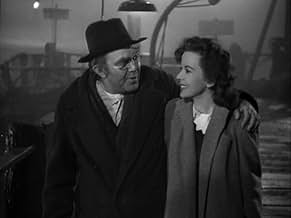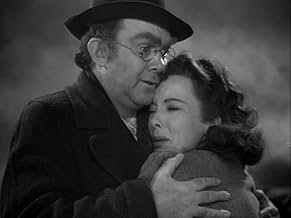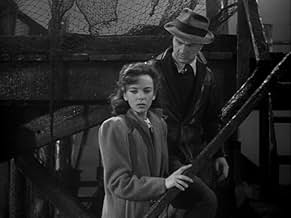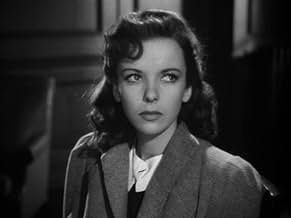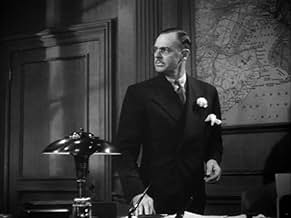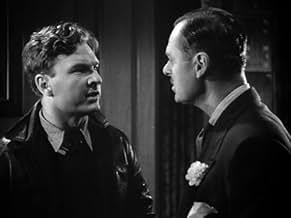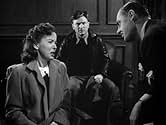IMDb RATING
6.7/10
2.5K
YOUR RATING
A Brooklyn pier racketeer bullies boat-owners into paying protection money but two fed-up fishermen decide to eliminate the gangster themselves rather than complain to the police.A Brooklyn pier racketeer bullies boat-owners into paying protection money but two fed-up fishermen decide to eliminate the gangster themselves rather than complain to the police.A Brooklyn pier racketeer bullies boat-owners into paying protection money but two fed-up fishermen decide to eliminate the gangster themselves rather than complain to the police.
Murray Alper
- Drug Store Soda Jerk
- (uncredited)
Frank Coghlan Jr.
- Newsboy
- (uncredited)
Jimmy Conlin
- Card Game Kibitzer
- (uncredited)
Alec Craig
- Man Reporting Fire to Magruder
- (uncredited)
Frank Darien
- Joe
- (uncredited)
Featured reviews
I found "Out of the Fog" to be a dreary film, in part because it takes place entirely at night (in a Hollywood studio's version of the slums of Brooklyn), and in part because its take on human nature is bleak.
John Garfield, as a small-time gangster, offers up no redeeming qualities; he's pure evil in a smarmy sort of way, and so not very interesting. According to TCM's Robert Osborne, Humphrey Bogart was considered for this role. Though Garfield was strong in other movies, I believe Bogie would have brought more to the table in this one than we see from Garfield.
Ida Lupino as the working class girl who wants to see a bigger, brighter world, falls equally short. She's sweet and kind to her father, yet dates Garfield's Goff character even after learning that Goff is shaking down dear old Dad. Her acting fails to reconcile these two facts (although the screenplay may equally be to blame).
Though "Out of the Fog" apparently had its roots in socialist perspective, it comes off as patronizing; the working class folk should be happy with their lot, it suggests, and when their pleas for help are ignored by their government (represented by the court here), their only ally is the working class cop who walks the local beat.
"Out of the Fog" fails as a film noir crime drama and as a morality tale. The ending is happy -- though everyone we're supposed to care about returns to their bleak existence -- but it is an unsatisfying resolution.
John Garfield, as a small-time gangster, offers up no redeeming qualities; he's pure evil in a smarmy sort of way, and so not very interesting. According to TCM's Robert Osborne, Humphrey Bogart was considered for this role. Though Garfield was strong in other movies, I believe Bogie would have brought more to the table in this one than we see from Garfield.
Ida Lupino as the working class girl who wants to see a bigger, brighter world, falls equally short. She's sweet and kind to her father, yet dates Garfield's Goff character even after learning that Goff is shaking down dear old Dad. Her acting fails to reconcile these two facts (although the screenplay may equally be to blame).
Though "Out of the Fog" apparently had its roots in socialist perspective, it comes off as patronizing; the working class folk should be happy with their lot, it suggests, and when their pleas for help are ignored by their government (represented by the court here), their only ally is the working class cop who walks the local beat.
"Out of the Fog" fails as a film noir crime drama and as a morality tale. The ending is happy -- though everyone we're supposed to care about returns to their bleak existence -- but it is an unsatisfying resolution.
John Garfield must have felt right back home with this gritty and relevant social drama that was originally on Broadway in 1939 as a Group Theater production. He fits the lead of Goff who's a dirty little protection racket gangster, terrorizing the gentle people who inhabit the Sheepshead Bay area of Brooklyn.
What must have annoyed Garfield no end was the ethnic cleansing of the story, the uprooting of all the Jewishness from the original play to the film. Out Of The Fog was originally entitled The Gentle People which was written by Irwin Shaw and ran for 141 performances on Broadway in 1939. If Garfield had not been in Hollywood in 1939 he could easily have been in the lead on Broadway.
On Broadway the part was played by Franchot Tone. Garfield fits the role perfectly, but I certainly would love to have seen what Tone did with the part. The Gentle People was hardly the kind of property that his studio MGM would have bought. Over at Leo the Lion Franchot Tone was rarely out of his dinner clothes, it was later when freelanced that he showed he was capable of this kind of role on screen.
The parts played by the two older men who are among several of Garfield's 'clients' are John Qualen and Thomas Mitchell. On Broadway they had distinctly Jewish last names and were played by Lee J. Cobb and Sam Jaffe. Garfield approaches these two men who are partners in a fishing boat and offers them 'protection' for $5.00 a week, a special rate because he's liking Mitchell's daughter Ida Lupino.
Shaw's play is of course an anti-Nazi allegory, but Warner Brothers decided to take the ethnicity away from the victims. Still the message is comes through loud and clear as Qualen and Mitchell decide that when the law doesn't work, they have to take matters in their own hands.
As always the mark of a good play or film is the development of lesser characters like Aline McMahon who is the longstanding perpetually suffering mother with continual aches and pains. Also Eddie Albert who plays Ida's steady reliable beau who looks rather plain next to Garfield's flash.
Robert Homans as the Irish cop on the beat who delivers a final summation for the results of the story has some words to the wise. There are times when conventional law enforcement won't do the job.
What must have annoyed Garfield no end was the ethnic cleansing of the story, the uprooting of all the Jewishness from the original play to the film. Out Of The Fog was originally entitled The Gentle People which was written by Irwin Shaw and ran for 141 performances on Broadway in 1939. If Garfield had not been in Hollywood in 1939 he could easily have been in the lead on Broadway.
On Broadway the part was played by Franchot Tone. Garfield fits the role perfectly, but I certainly would love to have seen what Tone did with the part. The Gentle People was hardly the kind of property that his studio MGM would have bought. Over at Leo the Lion Franchot Tone was rarely out of his dinner clothes, it was later when freelanced that he showed he was capable of this kind of role on screen.
The parts played by the two older men who are among several of Garfield's 'clients' are John Qualen and Thomas Mitchell. On Broadway they had distinctly Jewish last names and were played by Lee J. Cobb and Sam Jaffe. Garfield approaches these two men who are partners in a fishing boat and offers them 'protection' for $5.00 a week, a special rate because he's liking Mitchell's daughter Ida Lupino.
Shaw's play is of course an anti-Nazi allegory, but Warner Brothers decided to take the ethnicity away from the victims. Still the message is comes through loud and clear as Qualen and Mitchell decide that when the law doesn't work, they have to take matters in their own hands.
As always the mark of a good play or film is the development of lesser characters like Aline McMahon who is the longstanding perpetually suffering mother with continual aches and pains. Also Eddie Albert who plays Ida's steady reliable beau who looks rather plain next to Garfield's flash.
Robert Homans as the Irish cop on the beat who delivers a final summation for the results of the story has some words to the wise. There are times when conventional law enforcement won't do the job.
John Garfield is a sadistic, heartless thug in "Out of the Fog," starring Ida Lupino, Thomas Mitchell, John Qualen, and Eddie Albert. Garfield's life centers around intimidating scared, weak people into coughing up "protection" money so that he won't set their boats or businesses on fire or beat them to a pulp. Ida Lupino plays Stella, a young woman who's bored with her boyfriend (Eddie Albert) and sick of her life, and when she meets Garfield, she sees a chance for excitement. Little does she know that he's shaking down her father (Mitchell) and his partner in a fishing boat (Qualen).
This drama was interesting, had a rich atmosphere and a good cast. That, however, doesn't mean I enjoyed it. Garfield was so mean he was disgusting, John Qualen was so lily-livered I wanted to slap him, and all I could do was pity poor Thomas Mitchell. How Lupino could have had anything to do with Garfield after she found out he was demanding money from her father is beyond me.
The point of the film, brought home by Eddie Albert and Mitchell, is that Stella is just an ordinary girl and she shouldn't want or reach for anything special. Well, maybe she shouldn't have wanted or reached for any special via John Garfield, but how's that for a nice sexist 1940s message. However, the ending (not liked by at least one of the posters commenting here) does indicate that Stella will be able to achieve a balance in her life, so in that way, it was very satisfying.
The best characters were played by Mitchell and Qualen who, not surprisingly, give the best performances. They had a lot more to work with, Mitchell especially, and he gave it everything he had. Garfield's role was one-dimensional, and we learn nothing about how he came to be such a rat, so all you can do is hate him. Lupino's role is strictly ingénue - she found a better niche later on.
Interesting movie that, whether you like it or not, will hold your interest.
This drama was interesting, had a rich atmosphere and a good cast. That, however, doesn't mean I enjoyed it. Garfield was so mean he was disgusting, John Qualen was so lily-livered I wanted to slap him, and all I could do was pity poor Thomas Mitchell. How Lupino could have had anything to do with Garfield after she found out he was demanding money from her father is beyond me.
The point of the film, brought home by Eddie Albert and Mitchell, is that Stella is just an ordinary girl and she shouldn't want or reach for anything special. Well, maybe she shouldn't have wanted or reached for any special via John Garfield, but how's that for a nice sexist 1940s message. However, the ending (not liked by at least one of the posters commenting here) does indicate that Stella will be able to achieve a balance in her life, so in that way, it was very satisfying.
The best characters were played by Mitchell and Qualen who, not surprisingly, give the best performances. They had a lot more to work with, Mitchell especially, and he gave it everything he had. Garfield's role was one-dimensional, and we learn nothing about how he came to be such a rat, so all you can do is hate him. Lupino's role is strictly ingénue - she found a better niche later on.
Interesting movie that, whether you like it or not, will hold your interest.
This story features John Garfield at his nastiest. He is a dirty little thug who spends his time beating up poor fishermen in order to extort money from them. Just when you think it can't get any worse, it does as later in the movie Garfield not only wants one sailor's money but his lovely daughter as well! But, because Garfield is tough and ruthless, no one seems willing to go to the police or stand up to him in any other way. However, how this dilemma was solved was very atypical of Warner Brothers movies of this era and helps to raise this picture above most others. I won't divulge the exact ending, but it really tied the movie together well and felt very real as well as satisfying.
In spite of the effort to "open up" what had originally been a play, this drama, like so many other adaptations, remains stagebound and static. Even with imaginative sets, camera work and lighting, the scenes are essentially conversations: two (sometimes three) people talking, each representing a viewpoint in the story's conflict among moralities - scenes that are all but devoid of physical action, unless you count lighting cigarettes as action.
As for the characters themselves, they are largely one-dimensional, and unconvincingly unworldly for big-city people of the late 1930s. I found the Ida Lupino character hardly credible in her inability to resist the lure of small-time thrills promised by a fling with Goff: she does in fact resist him initially, she is gently warned about his likes by her father, with whom she has an excellent relationship, and despite her yearning for something more than what she has, Goff is no different from scores like him that she would have seen come and go over the years.
Lupino and Garfield are cast as "types," resulting in neither having an opportunity to utilize their considerable talents. Eddie Albert, as he so often does, plays an ineffectual nice guy. Aline McMahon is a complaining wife, a role that seems to have no particular function in the story. The honors do indeed go to Thomas Mitchell and John Quaylen, who make the most of characters given an opportunity to weigh things in the balance, change their minds, and act according to their principles. Even so, the "comical" closing scene is out of keeping with the overall mood of the picture.
As for the characters themselves, they are largely one-dimensional, and unconvincingly unworldly for big-city people of the late 1930s. I found the Ida Lupino character hardly credible in her inability to resist the lure of small-time thrills promised by a fling with Goff: she does in fact resist him initially, she is gently warned about his likes by her father, with whom she has an excellent relationship, and despite her yearning for something more than what she has, Goff is no different from scores like him that she would have seen come and go over the years.
Lupino and Garfield are cast as "types," resulting in neither having an opportunity to utilize their considerable talents. Eddie Albert, as he so often does, plays an ineffectual nice guy. Aline McMahon is a complaining wife, a role that seems to have no particular function in the story. The honors do indeed go to Thomas Mitchell and John Quaylen, who make the most of characters given an opportunity to weigh things in the balance, change their minds, and act according to their principles. Even so, the "comical" closing scene is out of keeping with the overall mood of the picture.
Did you know
- TriviaHumphrey Bogart was originally chosen to play Harold Goff. However, Ida Lupino had just finished shooting Une femme dangereuse (1940) and La Grande Évasion (1941) with Bogart, and they had not gotten along. Lupino protested, and because she was a bigger name than Bogart at the time, she got her way. An angry Bogart shot off a telegram to Jack L. Warner asking, "When did Ida Lupino start casting films at your studio?"
- Goofs(at around 18 mins) Stella is talking to Goff, but not looking at him, and says "You must be a very successful man; you've got a successful attitude." There's an immediate cut to Goff responding, and Stella is is looking directly at his face.
- Quotes
Olaf Johnson: She's 37 today. She wants me to go to her birthday party - her 37th birthday... so she says.
Jonah Goodwin: 37! She's fifteen minutes younger than the Roman Empire.
- Alternate versionsThe available version on VHS in Argentina was lifted from a 16mm print in English with Spanish language subtitles. The credits were also redone in Spanish.
- ConnectionsFeatured in The John Garfield Story (2003)
- SoundtracksConcert in the Park
(uncredited)
Written by Cliff Friend and Dave Franklin
[Played in the bar at the beginning; also played when Jonah and Olaf discuss moving the boat to Gravesend Bay and at the end]
- How long is Out of the Fog?Powered by Alexa
Details
- Release date
- Country of origin
- Language
- Also known as
- Danger Harbor
- Filming locations
- Production companies
- See more company credits at IMDbPro
- Runtime
- 1h 25m(85 min)
- Color
- Aspect ratio
- 1.37 : 1
Contribute to this page
Suggest an edit or add missing content


